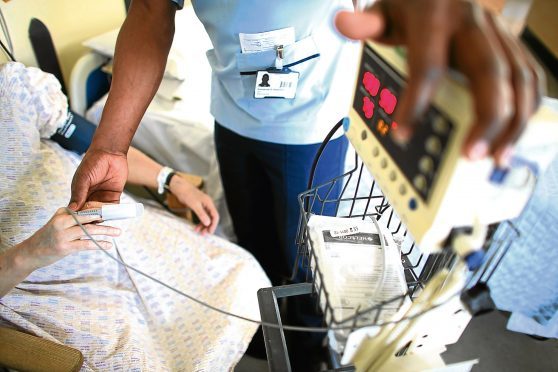Sir, – In a long-awaited crackdown on overseas patients who have treated the UK National Health Service as a free world health service, a change to the law in England means that hospitals will be obliged to identify patients who are not entitled to free NHS care and charge them in advance of treatment.
Health tourism costs the English NHS £1.8 billion every year.
The Scottish Government’s hatred of Westminster is well known as the pompous response of the Scottish Government spokesman shows.
“Making people show their passport and pay an upfront fee is not something we will countenance in Scotland,” he stated.
Our struggling, underfunded Scottish NHS will now see the millions of pounds foreign patients already do not pay escalate as foreign patients divert to Scotland for free treatment and Scottish patients are forced to wait even longer.
Clark Cross.
138 Springfield Road,
Linlithgow.
Cherry-picking Highway Code
Sir, – Harry Key made some fair points in his letter concerning cyclists and the Highway Code, but he cherry-picked somewhat and did not make a clear distinction between the code’s use of “should” and “must” for advice and requirements.
While cyclists are indeed advised to dress in bright clothes after dark, the same goes for pedestrians (Rule 3) yet in my experience this is far more widely ignored than Rule 59, and far less commented upon.
Despite being the code’s advice, fluorescent clothing has never proven to make a tangible safety difference to cyclists in studies.
While it was reasonable to include the advice at the code’s last full revision, evidence from the roads since does not support the ongoing preoccupation with its routine use.
It is ironic that so many people complain of the “invisible” cyclist they’ve just seen.
One needs to be visible enough, but beyond that more is not necessarily better, which is why it is entirely reasonable to drive a black car.
Peter Clinch.
31 Hazel Avenue,
Dundee.
Future will be very different
Sir, – Many of the arguments against universal income fail to take into account that the economy will be vastly different very, very soon.
It is akin to the unionist argument against an independent Scotland assuming we will have the same spending priorities.
Artificial intelligence is no longer science fiction, it is here.
Robotics have been with us for years and have transformed many industries.
Artificial intelligence is about to join it and make a clean sweep.
There is also the rise of digital currency.
We are headed into a very different world ladies and gentlemen. To boldly go…
Mark Harper.
22 Fitzroy Street,
Dysart.
A disincentive to employment
Sir, – The Scottish Government is keen to get more women into work, including those who might want to spend time with a child in its earliest years.
To this end, it is pledging to double the amount of money devoted to “free” childcare.
There is a problem with this. How does it square with Ms Sturgeon’s new policy, currently under discussion, of providing a universal basic income?
Surely providing a basic income for all citizens would discourage from working those who need to be coaxed with promises of “free” childcare? New mothers are not the only group in society who would be discouraged from seeking work by the provision of a “free” income.
Apart from the fact that a basic income for all would cost £12.5 billion per year that Scotland does not have, it would encourage some of those already in work to leave the workforce. Is this really what Ms Sturgeon intends?
Jill Stephenson.
Glenlockhart Valley,
Edinburgh.
Tawse ban has created louts
Sir, – I am appalled at the Scottish Government’s ill- considered intention to ban the reasonable chastisement of children by their parents.
In my school days, corporal punishment was a way of distinguishing the sheep from the goats.
It was only the brightest kids who realised that if an adult hit you, they had lost the argument and that you could continue what you were doing that had attracted their ire but with more discretion and care to avoid detection.
The thicker bairns, on the other hand, never made this connection and usually responded compliantly to a good belting.
Since the tawse was abolished in Scottish schools, we have seen generations of feral children growing up into ill-mannered and loutish thugs.
The few decent parents who attempt to do what schools used to do will now be deprived of a viable means to control their lumpen offspring.
And intelligent kids will miss out on a valuable lesson about adult psychology.
John Eoin Douglas.
7 Spey Terrace,
Edinburgh.
New law will divide families
Sir, – I cannot understand the Scottish Government’s support for a ban on smacking. It undermines something that nature has put in place, the family unit.
Of late we have heard that each child within a family was to have some sort of external mentor and now we hear that parents will not be able to chastise their children in the traditional way.
Dare I ask if our government thinks this will leave a family happier or more satisfied with itself or better off than it initially was?
Does government not see that if the a smacking ban comes into being, it will generate needless friction within a family? A father might feel that traditional punishment is best for the child while the mother screams that such a thing is now against the law.
No law is going to stop the rare cases where violence is used against a child. That should be reported and punished.
What is being proposed is yet another example of the wishful-thinking minority trying to force the people of Scotland into abandoning traditional attitudes that have served us all well.
What legislation is really being proposed? Is the government implying we need a court to tell us when a forceful pat on the bottom of a huffy child is considered to be a smack?
Archibald A. Lawrie.
5 Church Wynd,
Kingskettle.










